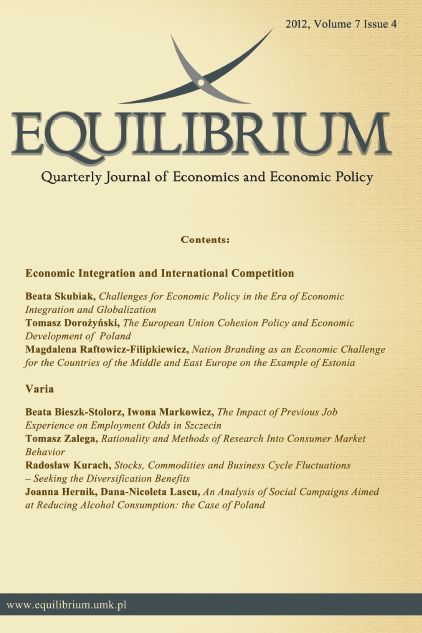The Impact Of Previous Job Experience on Employment Odds in Szczecin
DOI:
https://doi.org/10.12775/EQUIL.2012.027Keywords:
unemployment, logistic regression, employment oddsAbstract
The aim of this article is to examine the impact of job experience on the odds. The studies which have been conducted by the authors so far focus on such determinants of finding a job by the unemployed as: gender, age and education. It has been confirmed that they are the features determining both the employment odds and the time devoted to seeking a job. The authors have presented a thesis that an unemployed person?s professional experience conditions affect the likelihood of their finding employment. Moreover, the odds are not the same in individual subgroups of a given community. The research tool used in the presented analysis is a model of logistic regression which, following the logit transformation, enables the researchers to determine the odds ratio. The odds ratio makes it possible to compare the employment odds of a person who declares previous employment experience with that of a person who has not been employed before. The authors examined the influence of previous job experience on employment odds in a given community as a whole and in individual subgroups divided by gender, age and education. Statistical data were obtained thanks to a long-term cooperation with the Poviat Labour Office in Szczecin. The analysed data covered 19 398 people who unregistered from the Poviat Labour Office in 2009.
Downloads
References
Cramer J.S. (2002), The Origins of Logistic Regression, Tinbergen Institute Discussion Paper, Faculty of Economics and Econometrics, University of Amsterdam.
Frątczak E., Gach-Ciepiela U., Babiker H. (2005), Analiza historii zdarzeń. Elementy teorii, wybrane przykłady zastosowań, SGH, Warszawa.
Hosmer D.W., Lemeshow S. (2000), Applied Logistic Regression, John Wiley & Sons, Inc.
Jajuga K. (1990), Modele z dyskretną zmienną objaśnianą, [in:] S. Bartosiewicz (ed..), Estymacja modeli ekonometrycznych, PWE, Warszawa.
Markowicz I., Stolorz B. (2007), Identyfikacja determinant czasu oczekiwania na pracę bezrobotnych w Szczecinie, ?Wiadomości Statystyczne?, No. 12.
Markowicz I., Stolorz B. (2009), Wpływ sposobu kodowania zmiennych na interpretację parametrów modelu regresji logistycznej, ?Modelowanie i prognozowanie gospodarki narodowej?, Prace i Materiały Wydziału Zarządzania Uniwersytetu Gdańskiego, 4/2/2009, Wydział Zarządzania Uniwersytetu Gdańskiego, Fundacja Rozwoju Uniwersytetu Gdańskiego, Sopot.
Markowicz I., Stolorz B. (2010), Klasyfikacja bezrobotnych ze względu na wartości ilorazu szans podjęcia zatrudnienia przy zastosowaniu modelu logitowego, ?Taksonomia 17, Klasyfikacja i analiza danych ? teoria i zastosowania?, Prace Naukowe Uniwersytetu Ekonomicznego we Wrocławiu nr 107, Wrocław.
http://wup.pl/index.php?id=474#menu_top (as on 20 February 2011).
http://www.pupszczecin.pl/artykul,93.html (as on 20 February 2011).
http://www.stat.gov.pl (as on 20 February 2011).






